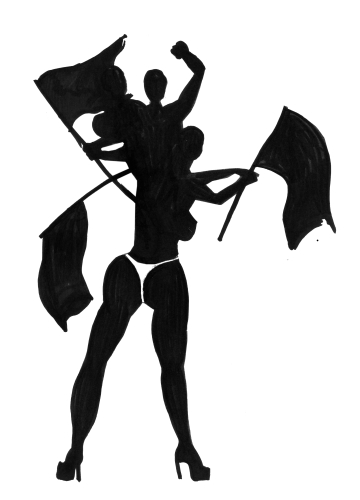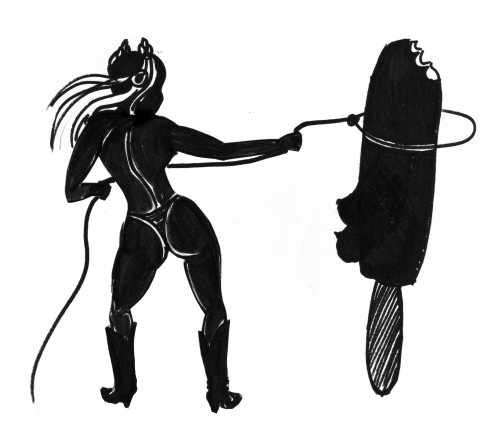When Nothing is Produced
Bourgeois society's reduction of sexuality to the logic of (re)production results in a series of rigid dichotomies. Drawing on a rich history of radical theory, Marcel Stoetzler rejects sexual dimorphism and the gay/straight split to imagine a sexuality that is free to recreate itself
In a society based on the separation and isolation of atomised individuals who are precariously chained together on the basis of a set of neurotic projections (nation, religion, family, etc.) and the practices and institutions that undergird them, it seems unsurprising that Tweedledee will occasionally, perhaps increasingly, have sex without the involvement of Tweedledum, or even of another Tweedledee. This has made society's defenders vilify masturbation as an antisocial form of subject-object identity that bypasses heterosexuality and the holy cow of sexual dimorphism. Apparently it threatens the healthy measure of neurosis that goes by the name of social cohesion.

All images by Anja Kirschner
The taboo on ‘the solitary vice' featured even in the thinking of bourgeois society's most radical progressives. Richard Carlile, editor of Tom Paine's works and of the Red Republican, unleashed in Every Woman's Book or What is Love etc. (1828) a ‘sustained attack on conventional sexual morality', advocating birth control and ‘Temples of Venus' for the ‘controlled, healthy, extramarital satisfaction of female desire'.1 In doing so he was motivated by promoting ‘the natural and healthy commerce between the sexes', and this also led him to a particularly ‘shrill' rejection of masturbation. His concern was a moral one: the ‘solitary vice' is a vice because it is solitary:
The debate over masturbation that raged from the eighteenth century on might therefore be understood as part of the more general debate about the unleashing of desire in a commercial economy and about the possibilities of human community in these circumstances.2
Thomas Laqueur refers to this as a ‘sexual version' of what he calls the Adam Smith problem: how can I make sure that the degree of community necessary for society's functioning reproduces itself spontaneously and continuously without challenging the principles of bourgeois, liberal, capitalist production, which produces the egoistic, calculating, monadic individuals who make community precarious, but also without an overtly Hobbesian, Leviathan-type state? This question which haunted Adam Smith has never lost anything of its near-universal grip on liberal thought. Like masturbation, prostitution was also vehemently attacked as a core antisocial evil for the first time in the 19th century.3 The modern obsession with campaigning against prostitution is grounded in seeing it as ‘a confusion between the dangerously asocial world of commercial exchange and the healthy social world of married love'.4
Laqueur draws a parallel between the 19th century discourse on prostitution and the 12th century papal campaign against usury (which subsequently re-emerged in the various forms of modern antisemitism), arguably the earliest and in this sense the original moral response to a (then) nascent market economy. The church hierarchy denounced the ‘usurious' charging of interest because ‘nothing real is gained by it'. In Thomist Catholicism, the usurer's capital is illegitimate because it is generated in the sphere of circulation only: it does not come from productive labour.5 The same pattern of argument is directed in the 19th century against prostitution: money earned from prostitution is illegitimate money since ‘nothing is produced.' Like usury, prostitution is ‘pure exchange'; like homosexuality and masturbation, it is unproductive and purposeless.6
All of them taken together are seen as undermining the form of sociality that is considered essential for the continued reproduction of bourgeois, capitalist, productive society by relevant sections of that society in the 19th century and beyond. The fury against prostitution is particularly interesting inasmuch as the exchange of equivalent amounts of sex and money could also have appeared to be in line with the spirit of commercial society. But the tendency of commodity relations to ‘really subsume' all aspects of life collides in the case of prostitution with the concern with social cohesion and a clean separation of the sphere of exchange from that of love, privacy, etc. Bourgeois society cannot consistently maintain that value-production is the only value it respects; it has to try to maintain values (family life, heterosexual love, parental affection, community cohesion etc.) that are undermined by the production of value. Luckily, though, its worthy efforts at moralising the commercial society are usually not very successful. More often than not, the ethics of production are already at the heart of the morality that is supposed to reign in the excesses of the capitalist mode of production, anyway.

It appears that thinking about sexuality has always been fundamentally shaped by the obvious but perplexing way in which the sexual act confounds, or burdens, lust with procreation. It is easy to see that lust would, certainly in the minds of philosophers, tend to inhabit the realm of freedom and spirit, procreation that of necessity and matter. This cannot but reverberate with the social fact that the concepts ‘man' and ‘woman' are similarly charged. The conceptual dichotomy of nature and spirit, matter and form is rooted in ‘the wish to escape nature on which though, one's life depends'.7 The crucial contribution of homosexuality to the history of human emancipation lies in its unequivocal assertion of the purposelessness of sexuality. Adorno writes that the homosexual becomes ‘the portent of a sexuality alienated from its proper purpose'.8 To ‘alienate' sexuality from its alleged purpose - procreation - is, however, the whole point of its emancipation. (In dialectical, critical theory, ‘alienation' can be a good thing.) If, however, the emancipation of sexuality can only mean its alienation from what society claims is its purpose, gender dimorphism, too, loses in the process its real basis. ‘Woman as an alleged natural being is a product of history which denaturizes her'.9 ‘Male logic' (a specific instance of what Adorno describes as ‘identity logic') refers to women only as representatives of a species that in turn is alleged to represent ‘nature'. Therewith it denies the ‘naturalness' of any particular woman which consists - to the extent that meaningful use of the term ‘naturalness' is possible at all - in her individuality, in the sense that individuality is any individual's identity against his or her identification (as Adorno would later put it in Negative Dialectic). In Minima Moralia he writes:
The female character and the ideal of femininity, on which it is modelled, are products of masculine society. ... The female character is a negative imprint of domination. But therefore equally bad. Whatever is in the context of bourgeois delusion called nature, is merely the scar of social mutilation. ... Glorification of the feminine character implies the humiliation of all who bear it.10
In the 19th century context, the idea was widespread that what makes human beings human is that they have begun to play with their ‘natural conditions', ‘whether one is talking about changing the course of a river or the sexual use of an orifice not naturally "intended" for the purpose'.11 In the modernist context ‘natural' does not mean ‘unchangeable' but, on the contrary, the natural may be what humans can and ought to change, and what they already are in the process of changing. This needs to be kept in mind when reading, for example, Marx's remark, in the 1844 Manuscripts, that ‘the most natural relationship between man and man is the relationship between man and woman'. Marx states that,
the relationship of man to woman ... reveals in a sensuous form, reduced to an observable fact, the extent to which the human essence has become nature for man or nature has become the human essence for man. It is possible to judge from this relationship the entire level of development of mankind. ...[the character of this relationship] demonstrates the extent to which man's natural behaviour has become human or the extent to which his human essence has become a natural essence for him...12
Marx differentiates here between the natural state of ‘human nature,' a quasi-pre-civilisational starting point, and the human nature, or human essence that becomes in the process of civilisation. He presents the gender relation as its touchstone. From this perspective, the notion that ‘man' ought to return to an original ‘human nature' is nothing but reactionary. Human nature - the humane - ought to become the nature of the human world, but it exists as yet only as potentiality, and in the pores and interstices of an inhuman reality. The following remark on the modern concept of nature, made by Marx in a 1862 letter to Engels, is important here:
It is remarkable how Darwin recognizes among beasts and plants his English society with its divisions of labour, competition, opening up of new markets, ‘inventions', and the Malthusian ‘struggle for existence' ... Hobbes's ‘bellum omnium contra omnes' .... in Darwin the animal kingdom figures as civil society ...13
Darwin reads society into nature, not the other way round. Gilbert Herdt wrote that it has been one of Darwin's basic assumptions ‘that sexual behaviour served the purposes of reproduction and selective fitness of individuals in evolution.'14 Reproduction is presupposed to be a central category of classification, and the general emphasis on dimorphism - the effort to force the male/female dichotomy on all living beings - follows from this presupposition. What works well, apparently, for humans, cannot be completely wrong for flowers. This view included the idea ‘that "male" and "female" are innate structures in all forms of life, including human beings, and that heterosexuality is the teleologically necessary and highest form of sexual evolution'.15

The critique of the naturalisation of heterosexuality must avoid, though, the naturalisation of whatever else:
We act sexually, we become sexual, but we are not constituted from the start as sexual beings. We are not driven, and we cannot act so as to liberate what is in process of being constituted. The goal of radical politics, therefore, cannot be the ‘liberation of sexuality' from social constraint. We can no more liberate libido than we can liberate the square root of minus one. There is no Thing there to liberate.16
‘Sexuality' cannot be liberated, only individuals can liberate themselves from oppression. Connell stresses that liberation cannot but be revolutionary:
It requires the overthrow of institutions, it depends on mass actions and it points to a profoundly altered social order. That a real revolution is involved was perfectly clear to women's liberation and gay liberation activists and theorists around 1970, and is exactly what has been lost in the evolution of theory ever since. The early formulas of sexual liberation, which drew their model of power and revolution from a bookish Marxism, were implausible. But they had a sound understanding of the depth of change involved.17
Adorno discussed the connection between the sublimation, integration and genitalisation of sexuality in his essay on ‘sexual taboos'. ‘[B]ourgeois society coped with the threat posed by the proletariat by integrating it', and likewise it integrated ‘the sexes', which it institutionalised, domesticated, neutralised and tolerated.18 ‘Whatever could not be integrated, the actual spiciness of sex remains under taboo'.19 Genital sexuality as the dominant form of sexuality is, according to Freud, the ‘result of integration'.20 This is a historically specific, impoverished and reduced synthesis of the ensemble of partial libidos and causes the ‘desexualisation of sexuality' when it makes a taboo, in turn, of the ‘partial drives'.21 In traditional society, taboos were directed at both the partial drives and genital sexuality. In the context of ‘formal freedom' taboos take different forms. The most efficient taboo comes in the shape of liberalisation: ‘sexuality is usurped by an ideal of naturalness, and in a culture of wholesome outdoor living is reduced as much as possible to pure genitality.' The liberation in the name of naturalness - nudism is a case in point - ‘fights back any refinement' (Adorno uses the French raffinement) in which the partial drives would have their place.22
The desublimation of the ‘partial drives' by the de-genitalisation of sexuality is central to Mario Mieli's concept of ‘gay communism'. Mieli argued against both the ‘identities' of hetero- and homosexuality (and also dismissed ‘bisexuality' as ‘nothing more than a rather poor conceptual compromise between those').23 If both homo- and heterosexuality are negations of some aspects of life, ‘gayness' is the negation of the negation. Mieli draws the parallel to communism as the negation of that ‘automatic monster', capital. The political aim of ‘gay communism' is general gayness whereby the word flips back into its older and broader meaning: happiness. Gay communism includes ‘new gay relations between women and men ... different from the traditional couple'.24 The ‘object of the revolutionary struggle of homosexuals is not that of winning social tolerance for gays, but rather the liberation of the homoerotic desire in every human being'.25 Repressed homosexual desire is in the present ‘converted' into many different occasions in which physical contact between members of the same sex is permitted (such as in sport), or where the symbolic rather than the actual phallus is celebrated: patriotism and drunkenness, ‘business partnerships, political rackets, gangs' and the rock star cult, religion (‘a universal obsessional neurosis of humanity').26 Seemingly revolutionary individuals committed to the critique and subversion of the bad state of things associate themselves in groups that conspire to murder this or that God-Father but, as if overcome by remorse, tend hurriedly to replace them with new ‘phallic and charismatic figures who "command" them'.27 The case for revolutionary desublimation, though, is complicated by the discovery of ‘repressive desublimation' (Mieli takes this term from Marcuse), by way of which ‘capital enables the unconscious to "emerge" in alienated forms, in order to subsume it':28
Perversion is ... studied, classified, valued, marketed, accepted, discussed. ... It becomes culture, science, printed paper, money ... if for millennia, therefore, societies have repressed the so-called ‘perverse' components of Eros in order to sublimate them in labour, the present system liberalises these ‘perversions' with a view to their further exploitation in the economic sphere.29
‘Perversions' must be repressed in order to become liberalised and fetishised into marketable sexual consumer products and liveable ‘identities.'

‘Freedom would be not to choose between black and white but to abjure such prescribed choices.'30 Is there a case for arguing that one could abjure the ‘prescribed choice' between being male and female? Have ‘man' and ‘woman' emerged in history and can they be expected to disappear, too? The French novelist and theorist Monique Wittig made the probably most powerful claim in that direction, pointing for this purpose to Marx's writing, where dialectical categories
such as the One and the Other, Master and Slave, were not there to stay and had nothing metaphysical or essential about them, but had to be read and understood in historical terms ... Thus the categories which are today called so solemnly categories of Difference ... were for Marx ... categories of social conflicts - which throughout the class struggle were supposed to destroy each other. 31
The aim of feminism is to abolish the class ‘men,' thus simultaneously abolishing the class ‘women,' ‘for there are no slaves without masters'.32 In Wittig's writings, lesbians, ‘whether they know it or not,' are beyond the category of sex, just as the proletariat in Marx's conception is beyond the category of class. Both mean the negation of a negative existence.33
When in the late 18th century ‘human sexual nature changed' (in the words of Virginia Woolf), it was argued that not only were the sexes different, but they were ‘different in every conceivable aspect of body and soul.'34 Sexual difference was now meant to be a ‘difference in kind, not degree'.35 It is in this context that ‘the discourse on sexual dimorphism begins to shape social theory'.36 The period that developed ‘claims of the sort that Negroes have stronger, coarser nerves than Europeans because they have smaller brains, and that these facts explain the inferiority of their culture' also came up with the notion that ‘the uterus naturally disposes woman toward domesticity'.37 Differentiations of gender preceded thereby those of sex.38 The interpretation of human bodies according to precisely two categories - neither more nor less than two - is logically an outcome of reducing the perception of erogenous zones of the body to those that are functional to reproductive activity: the sexual responsiveness of body areas that are irrelevant for reproduction is denied and may become taboo. These ‘desexualised' areas are thus made irrelevant to the sexual classification of bodies too. The concept of ‘the two sexes,' the one sex and the other sex, is therefore an effect of heterosexuality as a societal norm. The latter, in turn, is historically constituted. In European societies before the modern era, sexuality seems to have been less clearly dichotomised into hetero- and homosexuality, just as human bodies were less clearly and ‘deeply' categorised (‘sexed') into male and female. If Foucault is right, everybody was assumed - or rather, suspected - to perform homosexual as well as heterosexual acts, whereas since the 19th century homosexual acts are automatically considered to be expressive of the homosexual nature of the actor.39 Just as ‘race' is assumed to determine automatically and spontaneously the racialised individual, ‘sex' and ‘sexuality' are understood as irreducible urgencies.
What Ernest Renan (the liberal antisemite) claimed (in the affirmative) for nationality is true also for the imposition of dichotomous sex: on the one hand, it has to appear as a ‘daily plebiscite,' on the other, though, as something one has always been, something one has actively forgotten to have become and in how cruel a way one has become so.40 The violent history of the shaping of the object - A man! A woman! - ‘no longer appears with that object. Hence, ‘sex' is the reality-effect of a violent process that is concealed by that very effect' - in other words, a fetish.41 The abolition of ‘the linking of fields of social practice to the reproductive division' would mean that sexual difference would be simply a complementary function in reproduction, not a cosmic division or a social fate. There would be no reason for this (one set of differences amongst countless others, many of which are more important to most people) to structure emotional relationships. The categories ‘heterosexual' and ‘homosexual', and their derivatives, ‘man' and ‘woman', would lose much, perhaps most, of their significance.42
At that point, much less would be produced. One would have a better time.
Marcel Stoetzler's <sttzlr AT googlemail.com> publications include ‘Subject Trouble: Judith Butler and Dialectics' in Philosophy and Social Criticism 31:3 (2005), ‘Adorno, Non-Identity, Sexuality' in Tischler/ Matamoros/ Holloway (eds.), Negativity and Revolution: Adorno and Political Activism, Pluto Press, 2008, and The State, the Nation and the Jews: Liberalism and the Antisemitism Dispute in Bismarck's Germany, Nebraska University Press, 2008.
Footnotes
1 Thomas W. Laqueur, Making Sex: Body and Gender from the Greeks to Freud, Cambridge, MA: Harvard University Press, 1992, p.229.
2 Ibid.
3 Ibid., p.230.
4 Ibid., p.231.
5 ‘Thomist' refers to Catholicism as articulated by Thomas Aquinas (1225-74), a Dominican monk and author of the first comprehensive Christian theology.
6 Laqueur, op. cit., p.231-2.
7 H. J. Krahl, ‘Ontologie und Eros - zur spekulativen Deduktion der Homosexualität', in Konstitution und Klassenkampf: Zur historischen Dialektik von bürgerlicher Emanzipation und proletarischer Revolution, Frankfurt: Verlag Neue Kritik, 1971, p.116. Krahl was one of Adorno's students and highly regarded by him. He died in an accident in January 1970, six months after Adorno.
8 Theodor W. Adorno, ‘Sexualtabus und Recht heute', in Eingriffe: Neun kritische Modelle, Frankfurt: Suhrkamp, 1964, p.111; Theodor W. Adorno, ‘Sexual Taboos and Law Today', in Critical Models: Interventions and Catchwords, New York: Columbia University Press, 1998, p.80.
9 Theodor W. Adorno & Max Horkheimer, Dialectic of Enlightenment, London: Verso, 1997, pp.110-111.
10 Theodor W. Adorno, T. W., Minima Moralia: Reflections from Damaged Life. London, Verso, 1974, section 59.
11 Anonymous (booklet without date, probably London): ‘For a world without moral order' (no place indicated; also on the internet [http://www.geocities.com/CapitolHill/Lobby/3909/moral/ ]). First published in French in La Banquise 1, 1983, published also in a different, apparently earlier, English translation in Anarchy 38, Fall 1993; the French text ‘Pour un monde sans morale' can be found at: http://troploin0.free.fr/biblio/moral_fr/
12 Karl Marx, Early Writings, London: Penguin Books, 1992, p.347.
13 Alfred Schmidt, The Concept of Nature in Marx, London: New Left Books, 1971, p.4.
14 Gilbert Herdt, ‘Introduction: Third Sexes and Third Genders', in Gilbert Herdt (ed.), Third Sex, Third Gender: Beyond Sexual Dimorphism in Culture and History, New York: Zone Books, 1996, p.25.
15 Ibid., p.27.
16 R. W. Connell, ‘Democracies of Pleasure: Thoughts on the Goals of Radical Sexual Politics', in Linda Nicholson and Steven Seidman (eds.), Social Postmodernism: Beyond Identity Politics, Cambridge: Cambridge University Press, 1995, p.384, paraphrasing Sartre.
17 Ibid., p.390.
18 Adorno, 1964, op. cit., p.100; Adorno 1998, op. cit., p.72.
19 Adorno, 1964, ibid., p.101; Adorno ibid., 1998, p.73.
20 Adorno, 1964, ibid., p.104.
21 Ibid., Adorno, 1998, op. cit., p.75.
22 Adorno, 1964, op. cit., Adorno, 1998, ibid., p.75-6.
23 Mario Mieli, Homosexuality and Liberation: Elements of a Gay Critique, London: Gay Men's Press, 1980, p.53.
24 Ibid, p.211. It is noteworthy that the editor of the English translation added (in 1980) that the gay movement failed to maintain and develop more radical politics such as those expressed by Mieli (the Italian original was published in 1977) because it stuck to the concept of a biological sex underlying gender as the latter's ‘material base,' failing to go beyond the (feminist) discussions of the time. This seems to imply that debates in the gay movement had already by the late 1970s provided the critique of the sex/gender distinction that was epitomised by Judith Butler in Gender Trouble (1990). I have proposed a critical evaluation of Butler's position in ‘Subject Trouble: Judith Butler and Dialectics' in Philosophy and Social Criticism 31:3, 2005, pp.343-69.
25 Mieli, op. cit., p.82.
26 Ibid., pp.123, 126, 130, 135.
27 Ibid., pp.111-12.
28 Ibid., p.119.
29 Ibid., p. 208.
30 Adorno, 1974, op. cit., section 85.
31 Monica Wittig, The Straight Mind and Other Essays, New York: Harvester, 1992, p.52.
32 Ibid., p.5.
33 Wittig (more than Mieli) seems to presuppose an essential, a-historic, non-gendered transsexual human being, which is dichotomised, subjected, sexed only in second place, by society. Butler uses Foucault's critique of 1970s Reichians to make the point that there is no human essence prior to history and society. The most important point of critique she levels at Wittig would not apply to Mieli to the same extent: ‘Wittig's radical disjunction between straight and gay replicates the kind of disjunctive binarism that she herself characterizes as the divisive philosophical gesture of the straight mind. ... The ideal of a coherent heterosexuality that Wittig describes as the norm and standard of the heterosexual con Mieli, op. cit., p.82.tract is an impossible ideal, a ‘fetish', as she herself points out' (Judith Butler, Gender Trouble, Feminism and the Subversion of Identity, London: Routledge, 1990 p.122).
34 Quoted in Laqueur, op. cit., p.3.
35 Ibid., p.6.
36 Herdt, op. cit., p.35.
37 Laqueur, op. cit., p.155.
38 Laqueur, ibid., p.62.
39 This sums up some of Foucault's argument in The History of Sexuality, Vol. I - An Introduction, London: Penguin Books, 1979.
40 Ernest Renan, ‘What is a Nation?' in Homi K. Bhabha (ed.), Nation and Narration, London, Routledge, 1990, p.19.
41 Judith Butler, ‘Variations on Sex and Gender, Beauvoir, Wittig and Foucault', in: Benhabib/Cornell (eds.): Feminism as Critique, Cambridge: Polity, 1987, 128-42, here: p.135 (originally published in Praxis International).
42 R. W. Connell, Gender and Power: Society, the Person and Sexual Politics, Stanford, CA: Stanford University Press, 1987, p. 287.
Mute Books Orders
For Mute Books distribution contact Anagram Books
contact@anagrambooks.com
For online purchases visit anagrambooks.com







